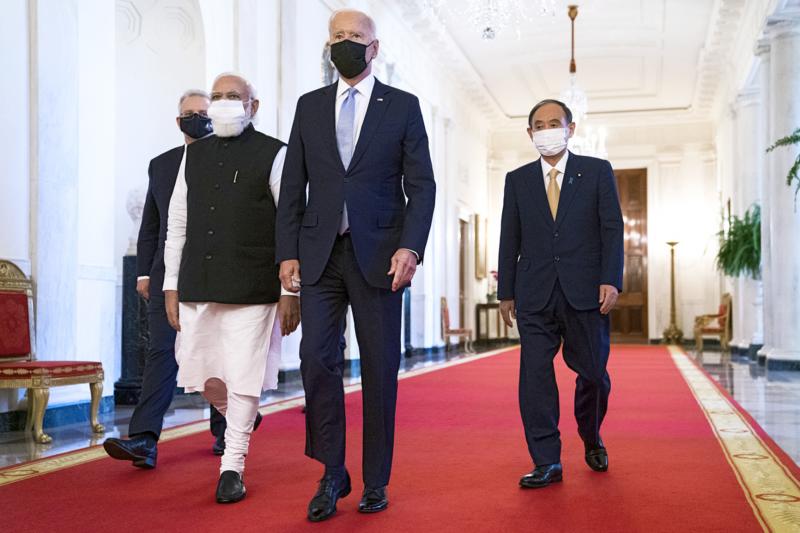India, Australia, Japan and the US are today to start the second phase of this year’s Malabar naval exercise in the Bay of Bengal, the Indian Navy said yesterday.
They are to be the first military exercises held by the Quadrilateral Security Dialogue (Quad) since Australia, the UK and the US announced their AUKUS pact on Sept. 15, under which London and Washington are to help Canberra obtain nuclear-powered submarines.
The three-day exercise is the 25th edition of the Malabar games, which began in 1992 as a bilateral exercise between India and the US, and have since grown to become a hallmark of Quad naval interoperability.

Photo: AP
The games have been held annually since 2002, with Australia and Japan joining for the first time in 2007. Japan became a permanent member in 2015 followed by Australia last year.
Phase 1 of this year’s exercise, hosted by the US, was held from Aug. 26 to Aug. 29 in the Philippine Sea off Guam.
The second phase intends to “build upon the synergy, coordination and interoperability developed during the first phase of the exercise and would focus on advanced surface and anti-submarine warfare,” the Indian Express quoted the Indian Navy as saying.
India is to send the Rajput-class destroyer INS Ranvijay, Shivalik-class frigate INS Satpura, P8I long-range maritime patrol aircraft and a submarine, the newspaper reported.
The US is to be represented by the USS Carl Vinson aircraft carrier and destroyers USS Lake Champlain and USS Stockdale, it said.
The Japan Maritime Self-Defense Force is to send its Izumo-class helicopter carrier JS Kaga and guided missile destroyer JS Murasame, while the Royal Australian Navy is to be represented by the Anzac-class frigate HMAS Ballarat and replenishment vessel HMAS Sirius, it added.

Taipei has once again made it to the top 100 in Oxford Economics’ Global Cities Index 2025 report, moving up five places from last year to 60. The annual index, which was published last month, evaluated 1,000 of the most populated metropolises based on five indices — economics, human capital, quality of life, environment and governance. New York maintained its top spot this year, placing first in the economics index thanks to the strength of its vibrant financial industry and economic stability. Taipei ranked 263rd in economics, 44th in human capital, 15th in quality of life, 284th for environment and 75th in governance,

The Sports Administration yesterday demanded an apology from the national table tennis association for barring 17-year-old Yeh Yi-tian (葉伊恬) from competing in the upcoming World Table Tennis (WTT) United States Smash tournament in Las Vegas this July. The sports agency said in a statement that the Chinese Taipei Table Tennis Association (CTTTA) must explain to the public why it withdrew Yeh from the WTT tournament in Las Vegas. The sports agency said it contacted the association to express its disapproval of the decision-making process after receiving a complaint from Yeh’s coach, Chuang

Control Yuan Secretary-General Lee Chun-yi (李俊俋) tendered his resignation last night, admitting that he had misused a government vehicle, as reported by media. His resignation was immediately accepted by the Control Yuan. In a statement explaining why he had resigned, Lee apologized for using a Control Yuan vehicle to transport his dog to a pet grooming salon on May 20. The issue first came to light late last month, when TVBS News reported that Lee had instructed his driver to take the dog to the salon. The news channel broadcast photos that it said were taken by an unnamed whistle-blower, which purportedly showed the

A former officer in China’s People’s Liberation Army (PLA) who witnessed the aftermath of the 1989 Tiananmen Square massacre has warned that Taiwan could face a similar fate if China attempts to unify the country by force. Li Xiaoming (李曉明), who was deployed to Beijing as a junior officer during the crackdown, said Taiwanese people should study the massacre carefully, because it offers a glimpse of what Beijing is willing to do to suppress dissent. “What happened in Tiananmen Square could happen in Taiwan too,” Li told CNA in a May 22 interview, ahead of the massacre’s 36th anniversary. “If Taiwanese students or